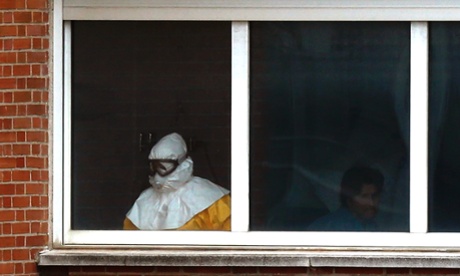Spanish hospital staff quit over Ebola fears
Madrid’s Carlos III hospital treating virus-hit nurse Teresa Romero Ramos suffers staff shortage amid concerns over training and safety

Carlos III hospital in Madrid is scrambling to contract extra personnel as worries about lack of training and safety standards have left some staff refusing to attend to possible Ebola cases.
Fourteen people are in quarantine, including four health workers who treated Teresa Romero Ramos, the Spanish nurse who contracted the virus after treating an Ebola patient repatriated from Sierra Leone. Seven people including two hairdressers who had given Romero a beauty treatment before she was diagnosed with Ebola turned themselves in late on Thursday to the isolation unit. None had so far tested positive for the disease except Romero, whose condition was described by the hospital as serious but stable. Her treatment has included injections with antibodies extracted from the blood of Ebola survivors.
While no official numbers were available, Elvira González of the SAE nurses’ union said fear of Ebola had caused some staff to refuse to treat certain patients, while others had resigned their posts.
Amid concerns over inadequate training and safety standards, one health worker told El País newspaper that many staff members were making excuses to avoid work. “They are saying they’ve got their period, that they’re getting dizzy, that they’re claustrophobic … People get anxious and they can’t work like that, being so nervous.”
Others worry about being stigmatised. “Their children aren’t being invited to birthday parties and their friends are cancelling joint vacation plans,” Juan José Cano of Satse, a nursing union member, told El País. “They’ve become known as the Ebola nurses. And it’s not fair.”
The hospital was not forcing staff to work, González said. “There are questions as to whether the protective suits are adequate, if the protocols are adequate. A health professional could accuse the administration of a public health offence if they are forced to work in conditions that are not adequate.”
The staff shortage has forced the hospital to seek help from unemployed health workers. One recent nursing graduate told El País she had delivered a CV to La Paz hospital in Madrid on Wednesday morning. Hours later, she received a call offering her work at the Carlos III hospital the next day. Initially, “they didn’t say one word about Ebola”, the 25-year-old said. After discussing the job opportunity with her family, she turned down the work.
Health authorities have done little to dispel claims by health workers’ that the response to Ebola in Madrid has been improvised. In August, when the first missionary with the virus was repatriated from Liberia, the Carlos III hospital was emptied to attend to him. When the second missionary arrived last month, it was decided that only the sixth floor would be cleared. Between appointments and surgeries, the hospital continued as normal.
Initially, the same was done after Romero Ramos tested positive on Monday. But as the number of patients in quarantine grows, authorities have been forced to hastily find more space. In recent days, two more floors have been cleared, with patients either discharged or transferred to other hospitals in the city.
No hay comentarios:
Publicar un comentario